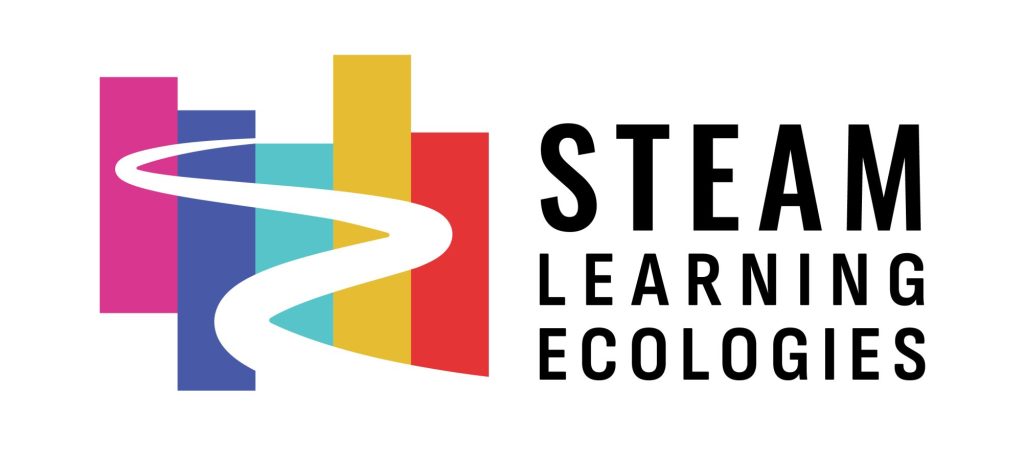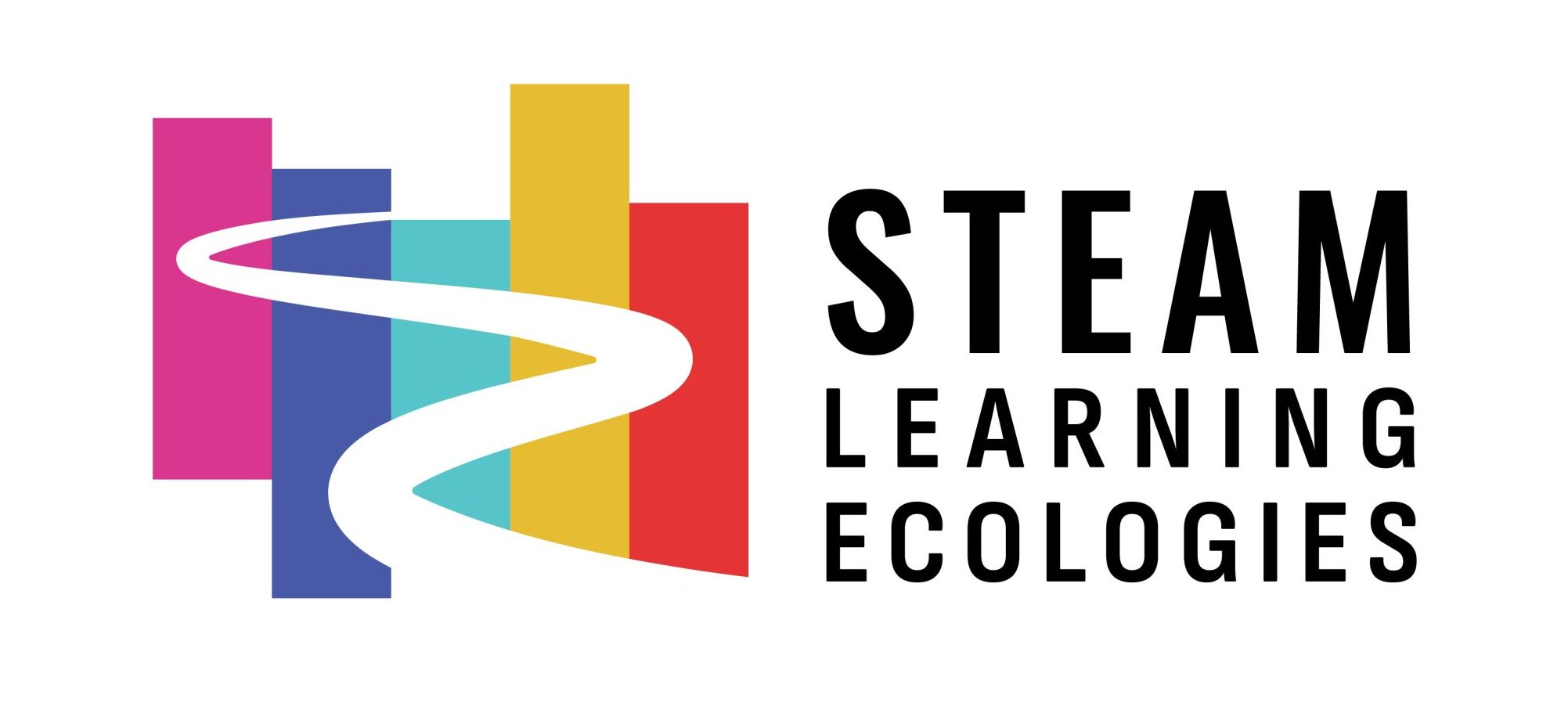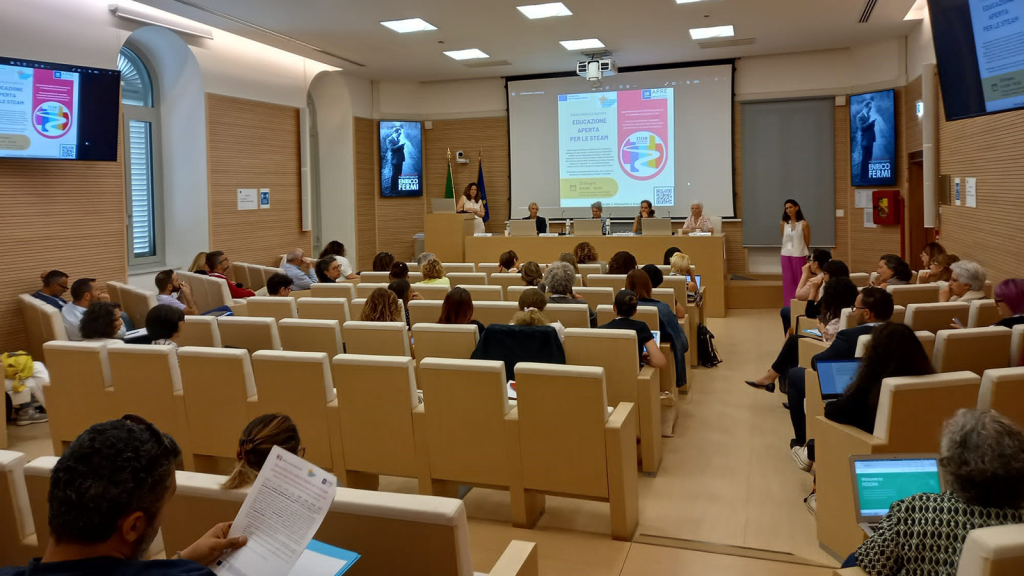Authors: Laura Mentini
On June 20th, 2023, as part of the Horizon Europe STEAM Learning Ecologies (SLEs) project, Agenzia per la Promozione della Ricerca Europea (APRE) hosted the inaugural co-creation workshop at the “Historical Museum of Physics and Enrico Fermi Study and Research Centre” in Rome. Diverse stakeholders from both national and local levels, including policymakers from the Ministry of Education, national agencies, public entities, teachers, education practitioners, civil society organizations, research centers, industry representatives, and financial institutes, gathered on this occasion. Their collective focus was to explore the possibilities of Open Schooling in the context of STEAM subjects, exchange best practices and experiences, and collaboratively devise novel ideas and projects to be implemented in the coming years.
The central concept underlying the workshop was that of “open schooling,” seen as a potent tool for envisioning and establishing enriching and inclusive learning paths through the interconnection of different learning contexts and environments. Additionally, the workshop emphasized the benefits of adopting an integrated and multidisciplinary approach to teaching STEM subjects, commonly known as the STEAM approach, which can enhance the learning experiences of all students.
The first part of the morning was dedicated to presentations on the existing legislations and good practices, from the Ministry of Education (Office VI – Educational and Digital Innovation), the National Research and Innovation Institute (INDIRE), the National Research Council (CNR-IRPPS) and the Science Department of “La Sapienza” University (Rome).
The first part of the workshop brought to light two pivotal themes. Firstly, “STEAM” education emerged as a transdisciplinary and transversal approach, seamlessly integrating essential skills like creativity, collaboration, critical thinking, and communication into STEM subjects, with a notable emphasis on addressing the gender dimension. Secondly, the notion of an “educational community” took center stage, envisioning education as a collective good, and advocating for its expansion into diverse learning spaces and resources to enhance quality, effectiveness, and inclusivity. This collaborative approach fosters the co-creation of new knowledge and solutions involving students, institutions, and researchers alike.
In this context, learning should inspire surprise and curiosity among students, achieved through experiential hands-on and outdoor activities, ensuring participation from students across all socio-economic backgrounds. Italy’s existing national legislation regulates STEAM education in schools, aiming to promote flexible, collaborative, and innovative learning environments. Recognizing the significance of teacher training and professional development, efforts are made to support the adoption of innovative STEAM methodologies.
Despite robust evidence supporting the benefits of the integrated STEM approach, research also highlights several challenges hindering its full implementation. These challenges include issues related to leadership, time constraints, available space, and the need for comprehensive teacher training. Moreover, the underrepresentation of women in science remains a significant barrier in dismantling gender stereotypes in STEM subjects. Lastly, sustaining and coordinating educational partnerships demand continual nurturing and dedication, much like any form of collaboration.
Addressing these challenges and fostering a collaborative, inclusive, and innovative environment in STEAM education requires ongoing commitment and concerted efforts from all stakeholders involved. By overcoming these obstacles, we can collectively pave the way for a more equitable, engaging, and effective learning ecosystem.
The second part of the morning focused on presenting the existing experiences of Open Schooling in STEAM within Italy. Many inspiring examples were presented, such as:
- Educational activities (games, workshops and events) organized by the Explora children’s museum in Rome, for both students and families;
- The European Researchers’ Night festival organized by the scientific association Frascati Scienza, which encourages students’ opportunities in STEAM subjects through interactive and hands-on activities;
- Environmental education from the Italian NGO World wide fund for Nature (WWF) in collaboration with teachers and schools, through practical experiences in nature to promote the well-being of students, sustainability actions and green skills;
- The Bibliopoint in Rome, a free public service and an example of virtuous collaboration between institutional libraries and schools, to promote active citizenship, integration and literacy;
- Schools collaborating with NGOs, civil society organizations (including APRE), parents’ associations through experiential workshop on the circular bioeconomy, student participation in artistic productions, cleaning interventions, scientific games and field trips;
- A free after-school project (Matemù CIES Onlus), focused on artistic and cultural growth, school support and future orientation, for students with migration backgrounds;
- Social enterprises and private foundations (Con I Bambini) which aim to combat educational poverty, support the socio-psychological well-being of young people and create educational partnerships and “community local agreements” through targetted funding.
During the afternoon session, the participants were involved in a group activity to co-design new learning ecologies in STEAM. Participants were divided into 5 heterogeneous groups, composed of different stakeholders (academics, teachers, research centers, NGOs, civil society organizations, public administration/institutions and industry representatives), and facilitated by the APRE staff. The objective of the activity was to design an Open School educational activity, based on active student engagement and problem-solving methodology, and implemented by a partnership of different actors other than the school. Participants were also asked to think about its goals and benefits as well as its potential challenges and solutions.
A total of six new ideas emerged from the co-creation exercise to be implemented in primary and secondary schools, collaborating with actors outside the school:
- “Food, environment and territory”: a path on food education and local traditions of the territory through workshops, trips and interviews
- An annual journey on marine education and blue economy through collective reading and writing, studies of the subject and experiential trips
- Activities on school management through environmental youth movements and green education
- Living lab on circular economy, sustainability and recycling
- “All stars lead to Rome”, a path on the monitoring and reduction of light pollution through recreational, exploratory, scientific and artistic activities
- Promotion of the local heritage of mountain communities through the podcast tool and intergenerational exchange
There are several recommendations and reflections that emerge from this event:
1) In Italy there are existing opportunities and funding available to support innovative STEAM approaches for schools and non-formal education actors which need to be better disseminated and coordinated.
2) For the creation of a STEAM learning ecology, some good practices are:
- The need to be knowledgeable about the local context to actively involve the local community and better disseminate the results;
- The active involvement of students from all socio-economic contexts is acquired especially through hands-on experiential and outdoor activities;
- The role of the researchers/experts that must be that of a facilitator, co-planning and implementing the activity with the teacher and students;
- Partnerships between actors need to be maintained, coordinated and nurtured over time, but they can also emerge spontaneously in the activity building process.
3) There is interest, need and urgency to work on issues related to the green and blue economy, environmental sustainability and promotion/preservation of local cultural heritage. In addition, the ideas that emerged from the co-creation activity underline the need to support the implementation of educational projects that aim to address global challenges through the involvement of all actors and the active participation of the students.
4) STEAM learning activities which are co-designed with students support the improvement of 21st century “transformative” skills, such as active citizenship, teamwork, environmental awareness, individual and collective empowerment, resilience and environmental responsibility.
5) The challenges and obstacles identified have highlighted the resources needed for the effective implementation of a STEAM learning ecology. These are related to the following aspects:
- Financial constraints and funding needed
- Regulatory constraints for schools
- Institutional support and formal collaborations
- Lack of interest/willingness to partner with private actors
- Sustainability/replication of the project beyond its duration and beyond the actors involved
- Teacher training
- Necessary time
6) Co-designing learning activities with different actors from formal and non-formal education is enriching and stimulating for all stakeholders. In fact, the different competences can support and feed each other: researchers contribute their ideas and scientific-technical skills, while teachers know the curriculum, school standards and the learning process of students.
7) It is necessary to continue creating spaces for exchange and networking between the actors which have a role in education at both formal and non-formal level, to share knowledge, good practices that can positively influence classroom practices and innovative learning activities in schools.
“I greatly appreciated the afternoon activity as a training experience (…) this allowed us to network with other realities, even different from ours and with which we can really create something useful” (Representative from Italian National Agency for New Technologies, Energy and Sustainable Economic Development).
The next steps are:
- In 2023/2024: APRE, as partner of the STEAM Learning Ecologies (SLEs) project, will pilot one STEAM learning ecology in schools, and will support the creation of stakeholder collaboration and the finetuning of the emerged ideas through trainings and creating spaces for virtuous cooperation amongst stakeholders.
- In 2024/2025, 10 new mature STEAM learning ecologies (SLEs) will be further implemented in the national territory.




